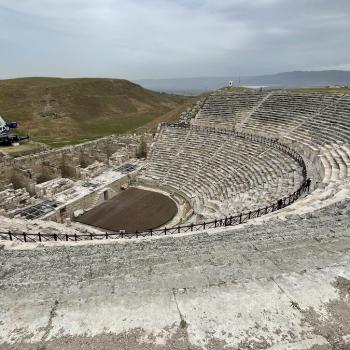
One of the hot button topics of contemporary evangelical Christianity deals with the nature of the church. In the still very young 21st century, both critics and advocates lend their voices to the conversation. Admittedly, ecclesiology—the study of the church—traditionally occupies just a few pages, maybe even chapters, in contemporary systematic theology texts. Compared to other subjects, only missiology—the study of missions— fairs worse! However, that is not to suggest that careful thought is missing in these two areas. Just within arms reach from my desk, we have such notable recent titles as:
Church Plantology
Apostolic Church Planting
The Forgotten Ways
Global Church Planting
Centered Church
Planting Missional Churches
However, as excellent as they are, some of these volumes concentrate on ecclesial methodology rather than ecclesiology proper. Contemporary books on the church tend to make assumptions regarding forms and functions. Additionally, authors pay little attention to the historical development of those forms and functions in the second century. Instead, we jump directly from the New Testament to the Reformation where we all know–tongue in cheek–evangelical history begins.
An Ecclesiological Agenda
Even so, considering the amount of news coverage given to megachurches and celebrity pastors of our day, one would think more attention would be given to the topic. Systematic and biblical theologians, along with missiologists, would do well to focus needed study on meaningful forms and functions for ecclesial bodies today. Instead, we seem settled, perhaps content, with monolithic Reformation ecclesiology whether Lutheran, Reformed, or Anabaptist.
We apply this 16th century ecclesiology in our post-christian and post-colonial era which appears more like the multi-cultural and religiously pluralistic centuries of early Christianity. And, we expect to see extraordinary results while ignoring the disconnect between church and culture. Indeed, we ask culture to make the missional move to the church rather than the church making the missional move to culture.
To arrive at an agenda for a contemporary treatment of ecclesiology, I suggest a careful study of historical theology. With this as a starting point, theologians and missiologists move toward a forward looking approach by first looking back. In this manner, we effectively address the “church” challenge of our current climate. Such an agenda recognizes the adaptive nature of the New Testament church. But to get there, we need to repent, that is change our thinking or frame of reference (see Hirsch and Kelly, Metanoia). Perhaps the starting place for such repentance begins with a study of the word “pastor” in the early development of church.
Church and Pastor
There might be no other word more associated with “church” than “pastor.” The two seem inseparable. The sundry titles in the church demonstrate the ubiquity of the word: senior pastor, lead pastor, teaching pastor, executive pastor, youth pastor, missions pastor, etc. It seems like there is no end to the number of pastors a church might have on their staff. Naturally, the volume of titles elevates the importance of the role.
Additionally, with the technological developments of radio and television, along side of social media marketing, pastors, both good and bad, have raised their status to levels of celebrity. Most achieve such status simply among their congregants. Few achieve national or international celebrity. With all the apparent fame associated with the word, you would think that it holds some special, even supernatural, meaning. Yet, the word itself is nothing unique. Indeed, pastor is a loanword from Latin that simply means “shepherd.”
In this blog, I make two important historical observations about the word in relationship to the early church: the frequency in which it is used and how it is used. In a future blog, I’ll address the implications of a historical study of the word “pastor.”
Frequency of Use
The Greek word translated “pastor” is ποιμήν. The New Testament uses ποιμήν 18 times. Only one instance refers to a gift in the church. Alongside of ποιμήν, Christ gave four other equally vital gifts (Eph 4:11). One other time, the verb form of ποιμήν describes what leaders did in caring for Christians (1 Peter 5:2). A few references use the word to mean shepherd as in the one who tends a flock of sheep (Luke 2). Most occasions use the word metaphorically as, for example, Christ the good shepherd in John 10.
Outside of the New Testament, the word appears just as infrequently. In 12 pieces of literature of the “Apostolic Fathers” dating from 67-180AD that I recently translated, we find the word rarely. For instance, ποιμήν is used once in reference to God being the shepherd of the church (Ignatius’ Letter to Romans 9), once in reference to Christ (Barnabas 5), and as a metaphor for those who lead a spiritual flock (Ignatius’ Letter to Philadelphians 2). All other references to leadership in the first and second century church writings that I examined use apostle (40+ times), prophet (50+ times mostly in reference to OT), teacher (10+ times), bishop (80+ times), elder (30+ times), and deacon (30+ times).
In the first 150 years of church literature, we easily count the number of times we see the word ποιμήν on our hands. As a title or role, even as a spiritual gift, “pastor” just does not appear to be a prominent feature in the early church.
How it is Used
Later in church history, early church historians appear to clarify ποιμήν. Although, clarification might be an overstatement since historians simply used the word in its context. The English translations of early church historians, however, often betrayed a bias toward the Latin loanword “pastor.” Two notable historians are worth examining: Eusebius and Socrates.
Eusebius’ Ecclesiastical History
Eusebius’ magisterial work entitled Ecclesiastical History, written in four editions between 311-324AD, spans the history of the church from the time of Christ to the time of Constantine: about 300 years. The volume comprises a total of 10 books. Remarking on Eusebeius’ brilliance, Kirsopp Lake notes,
“Part of his great claim to distinction is that when writing philosophy he never neglects history, or philosophy when writing history.” (1926:xv)
Eusebius, himself a bishop of the church in Caesarea, uses the word ποιμήν as a title or an office of certain recognized central figures who cared for churches. In some places, the word is synonymous with bishop and elder. For example,
“Of the martyrs in Phoenicia the most distinguished were those devoted pastors [gr. ποιμένες] of the spiritual flocks of Christ: Tyrannion, bishop of the church of Tyre; Zenobius, a presbyter of the church at Sidon; and Silvanus, bishop of the churches about Emesa.” (H.E. VIII.13.3)
In another place, it seems ποιμήν is distinct from the bishop and not as prominent in the ecclesial hierarchy:
“Thereupon a very large synod assembled at Rome, of bishops in number sixty, and a great many more presbyters and deacons; while the pastors [gr. ποιμένων – genitive case] of the remaining provinces deliberated in their places privately concerning what ought to be done.” (H.E. VI.43.2)
The Title ποιμήν in Eusebius
Those who held the title ποιμήν seemed to have responsibility for all believers in a city. There was generally only one ποιμήν as we see in Dionysius the ποιμήν of Corinth (H.E. III.4.11). Other prominent ποιμήν included Onesimus in Ephesus (H.E. III 36.5), Marcus in Alexandria (H.E. IV.11.6), and Cyprian in Carthage (VII.3.1). Their role seemed to include occasionally meeting with their peers to address issues of heresy as with Novatus (VI.43.2) and Paul of Samosata (H.E. VII.27.1).
In his 1904 translation of Ecclesiastical History, Arthur McGiffert exclusively translated ποιμήν as pastor. On the other hand, in Kirsopp Lake’s 1926 translation, he chose to translate the word as “shepherd” on two of the twelve occasions (III.37.3, IV.24.2). Of note in these passages, the title, ποιμήν, distinguishes itself from apostles and evangelists.
Socrates’ Ecclesiastical History
In a comparable history of Christianity, Socrates of Constantinople (380-439AD) uses the accusative form of ποιμήν four times. Three of those instances refer to a person (H.E. I. 12, II.23). In Book I.12, Socrates used the word twice and the English translator, A.C. Zenos, decided to translate the first instance as shepherd and the second as pastor. In this verse, Spyridon was clearly a bishop as is consistent with Eusebius’ understanding of the ποιμήν.
“With respect to Spyridon, so great was his sanctity while a shepherd [gr. ποιμένα], that he was thought worthy of being made a Pastor [gr. ποιμένα] of men: and having been assigned the bishopric of one of the cities in Cyprus named Trimithus, on account of his extreme humility he continued to feed his sheep during his incumbency of the bishopric”(H.E. I.12)
In a single instance in Book II.10, ποιμένα describes Christ as a shepherd.
Why Pastor?
The question arises as to why Eusebius and Socrates would use the word “pastor” at all. The strangeness of the question is exacerbated when we consider that there is little to nothing in church history which resembles what “pastor” has become. Translators make decisions that occasionally reflect a personal interpretation, even bias, more than the original author’s intent. Undoubtedly, Eusebius and Socrates never conceived the term “pastor” in any way that aligns with our modern English comprehension. The inconsistency and apparent arbitrariness of indiscriminately using “pastor” in English translations of church history betrays the consistent and precise use of ποιμήν in the New Testament. It also betrays its use in the literature of the disciples of the apostles.
Over the centuries, the unfortunate consequence of elevating “pastor” as a title discriminated against other roles and gifts in the church. Such roles and gifts were clearly present even in the time of Eusebius and Socrates. For example, Socrates writes about the continuing presence of the prophet and apostle in the third century,
“Hence it was that a little while before the time of Constantine, a species of heathenish Christianity made its appearance together with that which was real; just as false prophets sprang up among the true, and false apostles among the true apostles.” (I.22)
The Teaching of the Twelve
The Didache, also known as the “Teaching of the Twelve Apostoles,” adds clarity. Written two hundred years prior to Eusebius and Socrates, it recognized the presence of apostles who were also prophets (cf. the Greek in Eph 2:20):
“Now concerning the apostles who are also prophets, act according to the rule of the gospel. Let every apostle who comes to you be welcome as you would the Lord. But he will not remain more than one day or two days, unless there is a need. But if he remains three days, he is a false prophet. And when the apostle departs, let him take nothing but bread until he lodges the next night. If he asks for money, he is a false prophet.” (Didache 11)
Church history identifies a continuous thread of leadership. That leadership consisted of bishops and elders (sometimes referenced as shepherds), deacons, apostles, prophets, evangelists, and teachers. The implications for such a leadership will be the subject of the next blog.
In the meantime, what has pastor to do with celebrity? Well, to put it bluntly, nothing.












